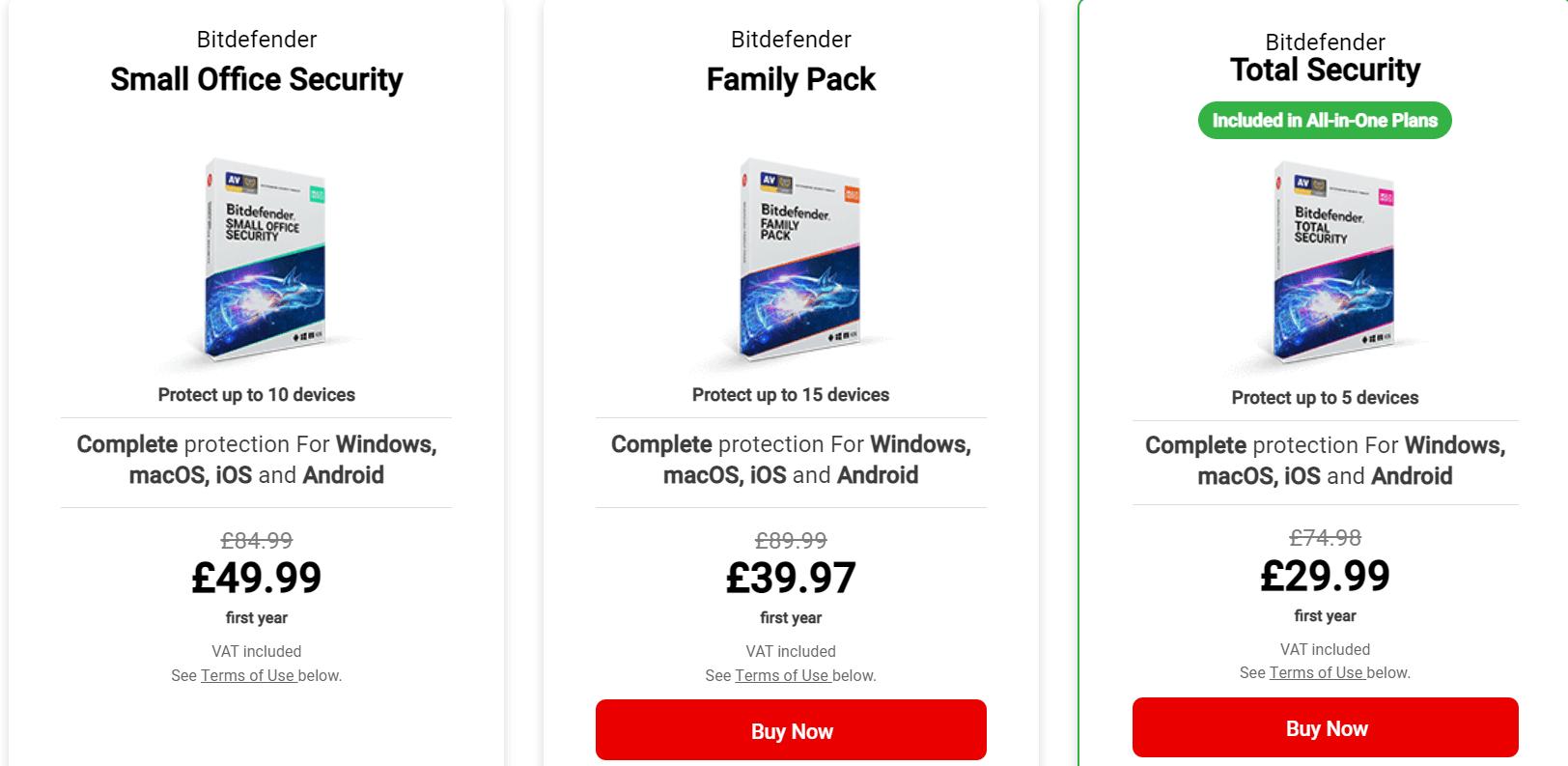
Content Outline
Main Differences Between Webroot vs BitDefender
Webroot and BitDefender differ in the following ways:
- In contrast to Webroot, BitDefender offers an annual subscription and a one-time payment option.
- Webroot starts at $150, whereas BitDefender begins at $14.99.
- With BitDefender, you can reach your audience in Dutch, Polish, Turkish, and English, while Webroot focuses mainly on English.
- In contrast, BitDefender can be used on various platforms, such as Windows, Android, iPhone/iPad, and Mac, while Webroot can only be deployed on Windows, web-based, and Mac platforms.
- BitDefender offers a better service quality than it has features. There are fewer features in Webroot.
- Webroot offers customer support only via email, phone, and tickets, whereas BitDefender offers support via email, phone, and live chat.
Quick Introduction to Bitdefender vs Webroot Antivirus
Bitdefender Overview
I was a cybersecurity executive at one of the private firms, and I had seen it all.
As technology advanced, so did our company’s data security threats. We needed something powerful–a solution to protect us from even the most sophisticated cyber attacks.
That’s when I got introduced to Bitdefender.

First impressions can be deceiving, but not in this case: right away, I was impressed by its comprehensive suite of protection tools – plus an intuitive user interface that allowed me to navigate it like a pro!
After setting up Bitdefender on my systems, I felt secure knowing that my company’s confidential data was now safe from malicious cybercriminals.
Webroot Antivirus
Webroot AntiVirus has a unique approach compared to most other antivirus software. It removes malware it recognizes and approves well-known programs. However, any program that is unfamiliar operates within a secure environment, unable to make permanent changes to the protected system.
Webroot relies on cloud-based analytics to decide what happens to these unknown programs.

While not as famous as Bitdefender, Webroot boasts swift scans and a light security approach.
Bitdefender vs Webroot
During my comparison, I picked out the most essential things a user needs to look at while choosing their antivirus tool. Below, I have compared Bitdefender and Webroot in terms of features, design functions, malware protection, system performance, and pricing.
Webroot vs Bitdefender in Features
Let’s first start with the feature comparison and look at which one has the upper hand.
Endpoint security is provided by Webroot, an innovative software that uses AI predictive technology. As a result, BitDefender provides small businesses, homes, and enterprises with the security they need against online attacks.
Webroot antivirus and BitDefender offer similar features, such as Password management and performance optimization. However, BitDefender protects your microphone and webcam, while Webroot protects only your webcam.
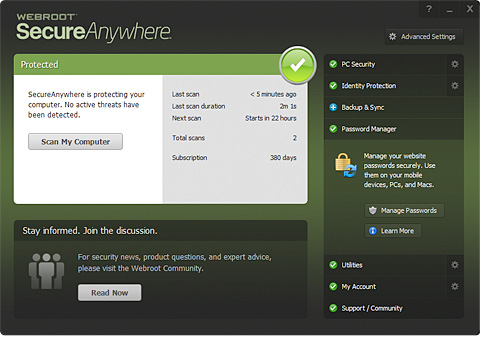
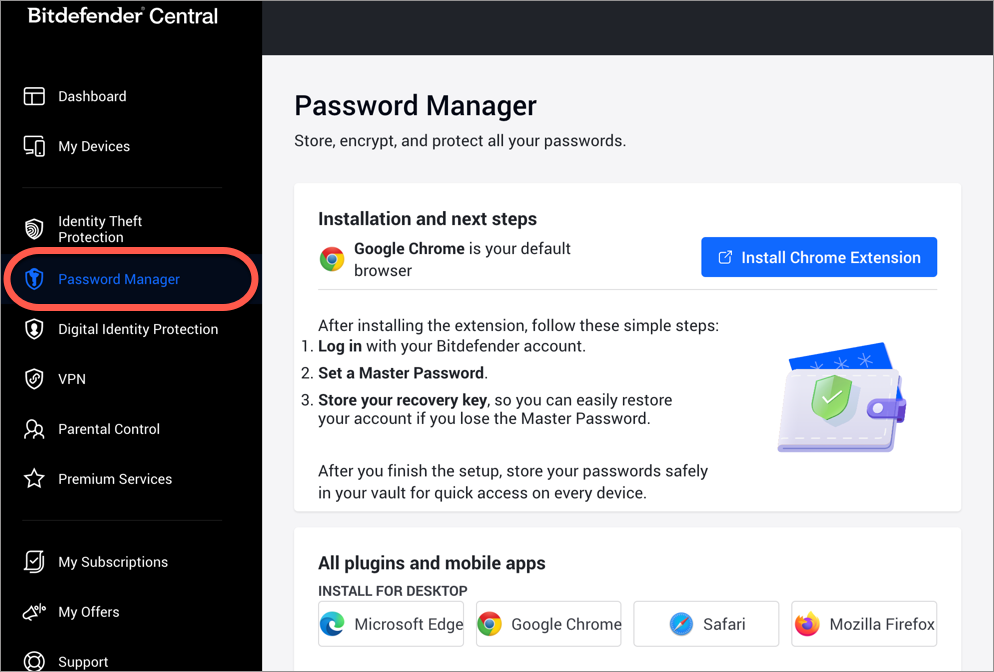
Webroot’s identity protection, Mobile security, real-time Anti-phishing, quick scans, and automatically encrypted storage appeal to many users. In contrast, BitDefender’s extra features, like real-time app monitoring, file shredding, VPN encryption, and compatibility across multiple devices, stand out.
It monitors and identifies malware activities through Webroot’s AI, machine learning, and massive data analytics, preventing them from attacking your computer before they can begin.
Unlike BitDefender antivirus, which relies on an on-premise deployment, Webroot is a cloud-based solution and does not require constant updates or definitions from the customer.
While Webroot automatically updates itself, it also has the advantage of being accessible from a single console from multiple locations. At the same time, BitDefender protects multiple internet-connected devices from just one platform.
If you are just interested in Mac-specific antivirus, Bitdefender Antivirus for Mac is your best option. It offers comprehensive anti-malware security along with a few useful utilities.
At the very top, there’s Bitdefender Premium Security – the best subscription that includes everything from the previous plans along with anti-theft and anti-spam tools. Even though it costs more, it lets you use it on up to 10 devices, works on more types of systems, and removes the limits from the VPN and password manager.
Bitdefender vs Webroot Malware Protection
Webroot provides analytics and visibility into attacks against network endpoints through its Secure Anywhere Business Endpoint Protection offering. Unlike BitDefender, this includes information about malware activity, from initial entry through final automatic removal.
Instead, BitDefender protects you from digital threats like viruses, trojans, worms, ransomware, spyware, and rootkits, whereas Webroot does not utilize these techniques in its pre-malware protection.
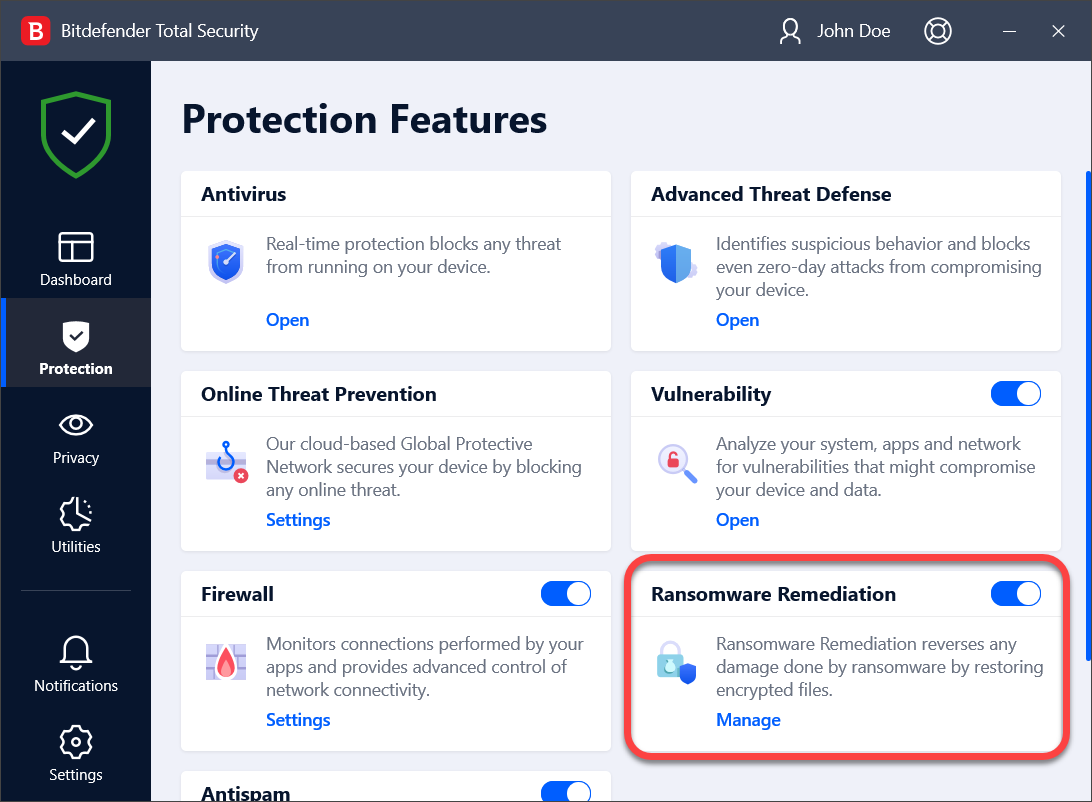
BitDefender protects your browsing activity through VPNs, ensuring your safety from malware and phishing attacks, while Webroot continuously monitors your system’s endpoints, immediately responding to malicious files before any damage can occur.
Winner: Bitdefender proves to be more effective against malware protection.
Webroot vs Bitdefender in System Performance
Unlike the thorough scan, the quick check only looks for harmful software in the usual spots on your device. Webroot uses more memory but doesn’t put as much strain on your CPU. Webroot finishes a quick scan in just 1 second, while Bitdefender takes around 3 minutes because it looks more deeply.
Based on tests by AV-TEST, Bitdefender gets a perfect score because it’s fast and doesn’t slow down tasks much. Webroot also gets a perfect score of 6 out of 6, but overall, it significantly impacts your computer’s performance.
Here’s a screenshot of the survey done by one of the organizations.
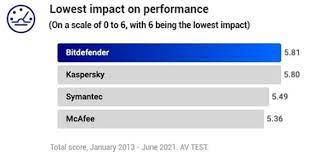
Winner: Bitdefender puts less pressure on the system performance as compared to Webroot.
Webroot vs Bitdefender in Customer Support
BitDefender is a well-known antivirus software provider, and many customers have praised its customer support team for the quick and helpful service they often provide.
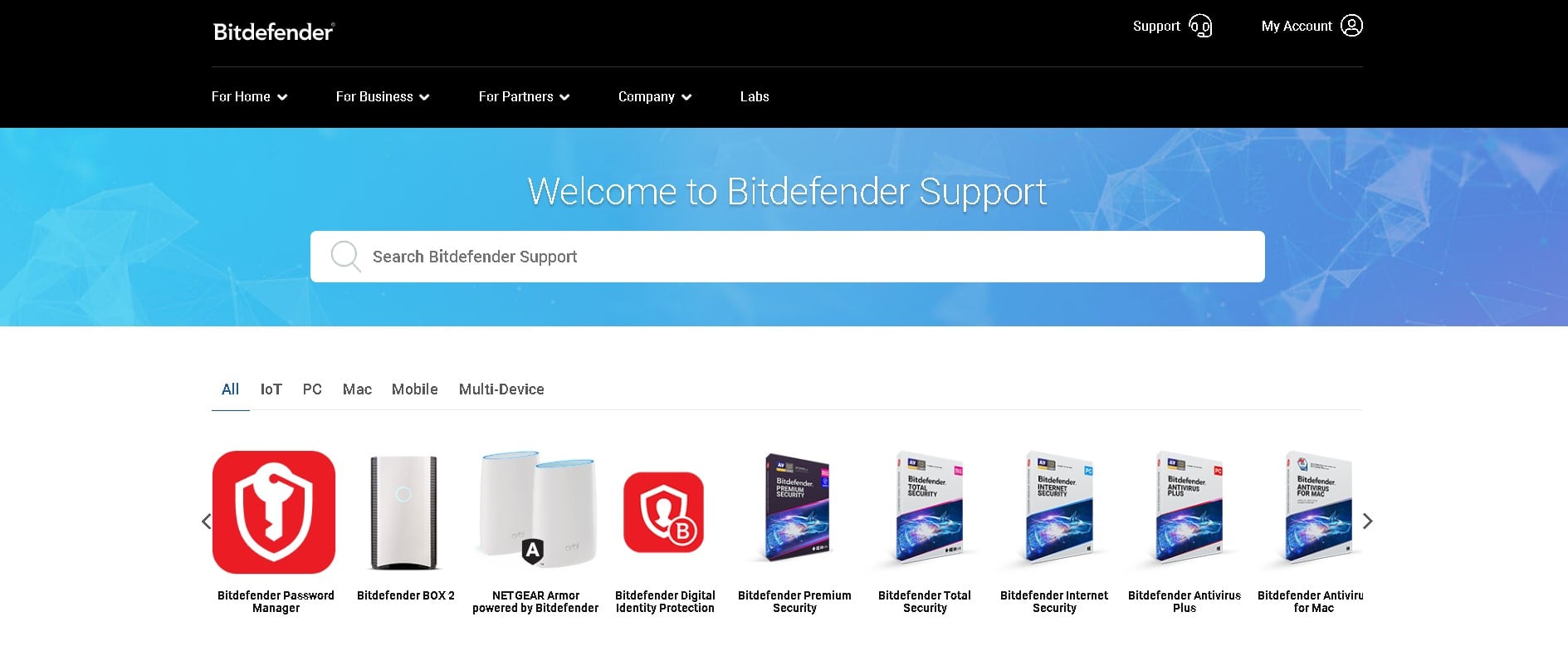
From simple instructions for using a product to more complicated technical advice, no issue is too complex or small for BitDefender’s customer support.
Both companies offer FAQs and guides to quickly find solutions before trying something else. If that doesn’t help, call Webroot or Bitdefender for customer support.
However, Webroot has a drawback. It doesn’t have a live chat, a common and quick way to get help with online security tools. Instead, it uses a system where you submit a ticket, and it takes a while for them to reply.
With so many choices, customers should have no trouble getting the help they need in a timely fashion when they turn to BitDefender’s dedicated customer support staff.
Webroot vs Bitdefender in User Interface
The BitDefender homepage has a simple sign-up, download, and installation process. Contrary to that, Webroot offers a straightforward checkout process even with a faster download time and installation.
Bitdefender stands out primarily because of its Quick Action option, which features small, customizable tiles. These tiles serve as shortcuts for your favorite actions, allowing you to execute tasks quickly. You can also organize your tasks and scanning tools based on your preferences and routines.
In contrast to Webroot, Bitdefender’s interface appears much more straightforward. It’s designed to be user-friendly and intuitive, particularly for those who aren’t tech-savvy.
If you want to simplify your weekly security tasks or tailor your experience, Bitdefender offers a great choice.
Turning to Webroot, its interface is also quite transparent, making it easy to initiate scans.
Winner: If you prefer having more control over how things look and work, Bitdefender is the way to go. On the other hand, if you’re looking for a straightforward antivirus option, Webroot might be more suitable.
Mobile Apps
Bitdefender outperforms Webroot on Android. It has a sleek app like its computer version and includes helpful features like app lock and autopilot.
In contrast, Webroot’s Android app has a low rating due to weak scanning and lacking features like data breach monitoring and real-time protection.
Regarding antivirus apps for iOS, both Webroot and Bitdefender don’t excel. Since iOS already has many security tools built in, antivirus programs aren’t as vital. While Bitdefender is still helpful, it offers fewer features for iOS devices.
When considering apps and how they look and work, Bitdefender clearly comes out on top. Its mobile apps are well-maintained and stand out. On the other hand, Webroot’s apps are outdated and less impressive compared to most competitors.
Pros and Cons of Webroot vs Bitdefender
Webroot Pros and Cons
Pros |
Cons |
|
|
|
|
|
|
|
|
|
Bitdefender Pros and Cons
Pros |
Cons |
|
|
|
|
|
|
|
|
|
Conclusion: Which Antivirus is better?
After considering everything, Bitdefender stands out with more features and better performance than Webroot. It comes with a host of security features: scanning, real-time protection, web attack prevention, password manager, and anti-phishing.
Webroot doesn’t offer the thoroughness or affordability needed to compete with Bitdefender as the top choice for most people.
Webroot is convenient and boasts rapid scanning time, a simple interface, powerful malware protection, and unique features such as cloud-based management and predictive prevention.
Read our other comparisons:




